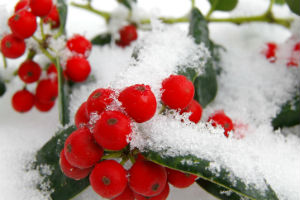More than 40 million Americans suffer from year-round and/or seasonal allergy symptoms. Winter and the holiday season are full of additional triggers for some of those with allergies and asthma. Food allergies, seasonal scents, and dust and mold found on some decorations are just some of the concerns for this group. Here are some tips on how to keep the joy in the season.
- Avoid holiday air fresheners. Gingerbread, pumpkin, and pine can be inviting for some, but hazardous for others. One-third of people with asthma report health problems from air fresheners, which contain volatile organic compounds (VOC’s). VOC exposure can increase the risk of asthma in children. Holiday candles and other items that provide seasonal scents can also trigger allergic symptoms in some people.
- Christmas trees are often cited as the source of an allergy attack during the holidays. The mold that is associated with watering live trees and the chemicals sprayed on these trees are the most likely culprits. Also, tree sap contains terpene and other substances that can irritate skin and mucous membranes. Trees may also be harboring pollens from their time on the tree farm. If you choose a live tree, try blasting it with a leaf blower or rinse it and allow it to dry prior to bringing it inside. Wear long sleeves and gloves when handling the tree. Running an air purifier in the same room as the tree may also reduce your allergic symptoms.
- Artificial trees and other decorations can still trigger symptoms due to the dust and mold they often harbor. Remember to store artificial trees and other decorations in dry/airtight containers and wipe down before storing.
- Poinsettias, a member of the rubber tree family, are everywhere this time of year. Stay away if you have a latex allergy.
- The holiday season means dining out, parties, and special foods. The key to managing food allergies is to be certain what foods cause your symptoms and to communicate this information to others. Allergy skin prick testing is the most accurate test for diagnosing your allergic triggers. Always inquire about ingredients, and never leave home without your injectable epinephrine (at any time of the year!)
- Be careful at the holiday feast. Food allergens show up in the strangest places—so be cautious when making your plate. You may be surprised to learn that even turkey can be tricky! Allergens in stuffing can be absorbed into the meat, so cook the bird unstuffed. Consider natural turkey that has no additives. Some self-basting brands contain soy, wheat and/or dairy.
- If your child has a food allergy, volunteer to provide allergen-free snacks to ensure there will be safe foods available your child can enjoy. Remind your child to always ask if this food is “safe” for them, as there is an abundance of new items around during this season.
- A fire in the hearth is wonderful this time of the year, but smoke is a common trigger for those with asthma. If you're asthmatic, you might have to mingle in another room, and as always, stay away from cigarette smoke.
- Fido and The Thanksgiving Effect. You may have become tolerant to your dog or cat, but if you go away for the holidays, or are a college student returning home for the break, you may find yourself sneezing and wheezing. This is known as The Thanksgiving Effect. Speak with your allergist for ways to control your symptoms.
- When the temperatures turn cold, we stay indoors more. Those cozy indoor days make us more susceptible to allergy and asthma triggers like dust mites, pet dander, and cockroach droppings, as there tends to be less ventilation in the winter months. Forced-air furnaces circulate airborne dust containing lint, animal dander, bacteria, fabric fiber, and food material. Change air filters frequently, wash bedding in hot water, and buy allergen-resistant covers for pillows and mattresses. Because dust-mites thrive in high humidity, think about using a humidifier/dehumidifier to keep indoor humidity between 30 and 50 percent.
- And finally – take care of you! Get enough sleep, manage stress, and stay hydrated. Always carry your allergy and asthma medications like antihistamines, inhalers, and epinephrine with you. If traveling by plane, pack medications in your carry-on bag in the event your luggage does not arrive with you. Wash your hands frequently to avoid illness, and get your annual flu shot. No one wants to be sick, especially this time of year!

